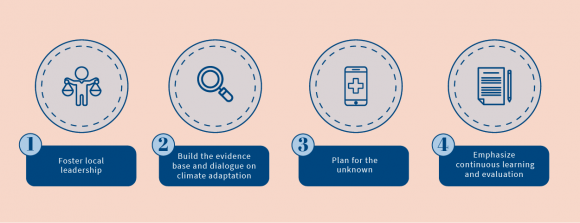Tess Mpoyi
Former Senior Policy Advisor

PACE supported environmental and development efforts while advancing reproductive health around the world.
March 11, 2022
Former Senior Policy Advisor
Former Policy Analyst
Our modern world is marked by global environmental changes on an alarming scale, signified by rising sea levels, changing weather patterns, and increasing drought and desertification. As the ongoing COVID pandemic has shown us, we can no longer ignore the ways in which health, the environment, and well-being are interlinked—ways that do not impact all people equally. Low- and middle-income countries, especially those facing rapid population growth or security and stability threats, face an undue burden. Communities and groups with the least access to resources, often including women and young people, have fewer means to ensure resilience in times of uncertainty.
Since 2015, PRB’s Policy, Advocacy, and Communication Enhanced for Population and Reproductive Health (PACE) Project has worked alongside other champions across the globe to integrate population and reproductive health solutions into complex challenges, including climate change and development. PACE’s work illuminates how expanded access to and use of voluntary, rights-based family planning not only improves health and well-being, but also promotes gender equality, stable livelihoods, economic dividends, enhanced resilience, and environmental health.
After seven years, what lessons emerge from PACE’s experience applying a multisectoral population, environment, development (PED) approach in a changing world? What can tomorrow’s advocates learn from the PACE story?
PACE applied PRB’s policy communication training curriculum to build the skills of champions advancing evidence-based multisectoral policy and programming, including national Population, Health, and Environment (PHE) networks, National Population Councils, youth advocates; academics; and health and development professionals. PACE trained 79 champions in more than 13 countries on how to effectively integrate data and evidence into policy decision-making and provided targeted technical assistance to more than 160 partners to strengthen links between population, reproductive health, and the environment over the course of the project. These champions effectively advanced evidence-driven PED policies in their contexts.
In December 2019, PACE and GOAL Malawi trained 10 youth advocates from East and Southern Africa working in wildlife conservation, family planning and reproductive health, nutrition, and agriculture on how to communicate with policy audiences to advocate for holistic, integrated PED approaches that promote healthy communities and a healthy planet.
Following the training, several youth advocates achieved significant outcomes in their communities:
I couldn’t have known or have the ability to figure out who my audiences are, plan for my policy goal, even forming one. The partnership increased knowledge, provided necessary guidance, ability to meet deadlines, implementation of planned tasks, and increased self-confidence while meeting various stakeholders.”
—Thomas Shabalala, South Africa, PACE PED youth advocate
PACE created and curated a wide array of resources to inform the global discussion of PED, including practical tools and resources for PED practitioners in the field. This collection included analyses and briefs distilling PED evidence, virtual engagement events such as webinars to share updates on developing programs and practices, an activity map of multisectoral projects, communities of practice, an e-learning course, a toolkit, reports and infographics, and more. These tools and platforms offered a centralized hub of knowledge for the PED community.
This user-populated map features field-based projects in 33 countries relating to population, health, environment, and/or development, as well as funders and organizations focused on relevant policy and advocacy research and learning. It enables multisectoral practitioners, advocates, and donors to easily access information about ongoing and completed projects around the world.
In addition to supporting PED champions, PACE successfully made the case with high-level decisionmakers outside the health sector for increased investment in population and reproductive health in multisectoral approaches, securing commitments to increase PED programming.
In September 2020, PACE and Kenya’s National Council for Population and Development brought together major global donors and development institutions working in environmental conservation with expert speakers and practitioners in PED. Several participating organizations, including the International Union for Conservation of Nature (IUCN), the United Nations Food and Agriculture Organization (FAO), the Mortenson Family Foundation, The Nature Conservancy, Pathfinder International, and the Cheetah Conservation Fund, endorsed a set of recommendations to include population dynamics, family planning, and reproductive health in their programming.
As the PACE Project ends, lessons from its approaches can inform and enhance the PED community and support the next generation of leaders in the field. New trends, innovations, and evidence are emerging constantly, and the urgency to provide simple, effective approaches to pressing development and environmental challenges is greater than ever before. Fellow PED champions and advocates should embrace the following opportunities to enhance their effectiveness in a changing world:

Foster local leadership
PACE made significant strides to equip local partners with tools and approaches to advance PED in their communities. In particular, the project worked to tailor technical assistance and capacity strengthening to local champions advancing PHE in their contexts, while connecting them to a global advocacy community. Future champions should continue to place decision-making and priority-setting with local actors and governments.
Build the evidence base and dialogue on climate adaptation
PACE contributed to a growing evidence base linking family planning and reproductive health with increased climate adaptation and resilience. This area show great promise both for continued research and access to climate adaptation funding for family planning and reproductive health projects through multisectoral approaches.
Plan for the unknown
The emergence of COVID-19 was an unprecedented challenge to the global community. Planning for nimble and responsive programming, with continuous learning and feedback loops for improvement, can help partners and implementers adjust to changing conditions and improve the odds for success.
Emphasize continuous learning, evaluation, and adaptation
Capturing results and sharing best practices are cornerstones to strengthening the PED community and promote sustainability. Implementation approaches that prioritize adaptive learning can improve program effectiveness during times of stability and be especially useful in responding to system shocks, such as the COVID-19 pandemic.
